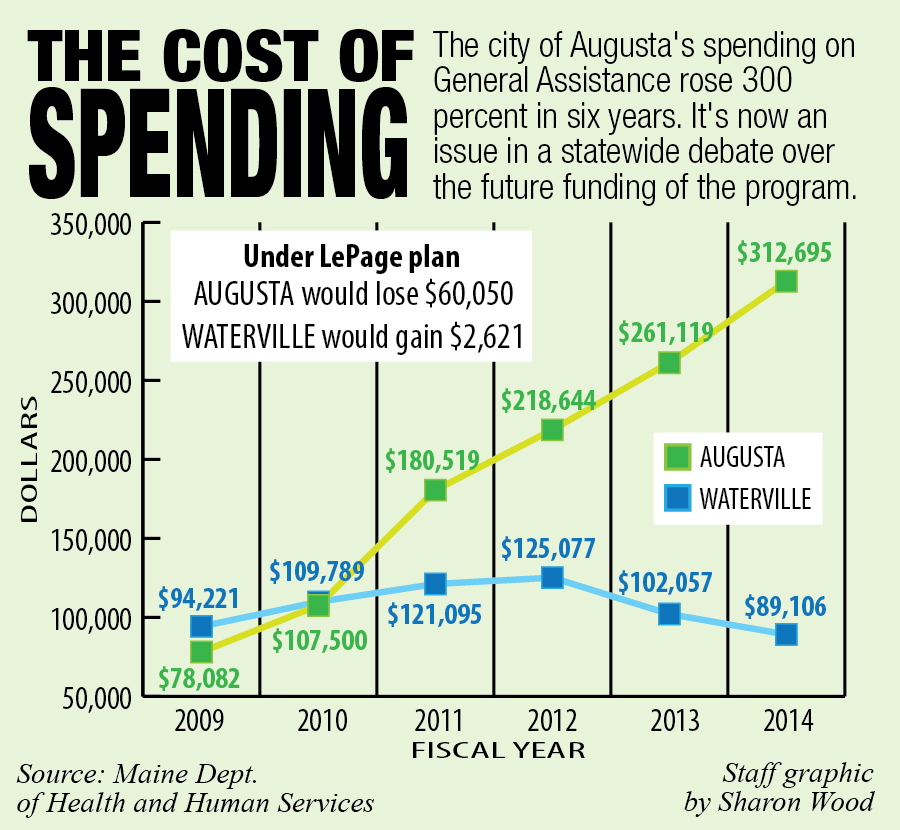AUGUSTA — Looking to change the way Maine funds municipal welfare, Gov. Paul LePage’s administration is driving a wedge between Kennebec County’s two biggest cities.
Augusta and Waterville are 18 miles apart with much in common: Maine’s capital city has just 3,000 more people, and Waterville’s 19 percent poverty rate is just one percentage point higher than Augusta’s.
But when measuring spending on General Assistance — a state and local program helping eligible low-income people pay for rent, food, heating fuel, electricity and other necessities — the service centers are much different.
From 2009 to 2014, Augusta’s GA spending grew 300 percent — from $78,000 to $313,000 — while Waterville spent just $89,000 on GA in 2014, according to state data from the Maine Department of Health and Human Services. Across Maine, state and local governments spent $18 million on GA in 2014, up 30 percent since 2009 and more than doubling since 2004.
The Republican governor’s proposed two-year budget looks to cut that by $5.4 million annually by changing the way the state reimburses cities and towns. That plan is aimed explicitly at Portland, which accounted for the vast majority of Maine’s program spending in 2014 and has faced withering criticism from the LePage administration.
Portland has said it could lose as much as $6 million in a year under LePage’s plan. At current spending levels, the state says Augusta would lose $60,000 per year, while Waterville would gain $2,600.
In December, the Maine Department of Health and Human Services reviewed Augusta’s GA program, saying it was in compliance with law and department rules, listing only two cases of missing information as areas of concern.
But after a Kennebec Journal story on the proposed budget’s effect on Augusta, David Sorensen, a department spokesman, emailed a graph to the newspaper’s staff that compared Augusta’s GA spending with Waterville’s, calling it “one place Augusta could better manage its spending.” In a Friday statement, LePage’s office said Augusta spends “more than its fair share” on GA.
Municipal data shows that the cities aren’t as similar as they look. While the cities serve similar numbers of people, Augusta has more housing stock than Waterville does, which city officials say attracts eligible people, including families, to the community.
“Their spin is, ‘This is out of control,'” said Ralph St. Pierre, Augusta’s assistant city manager, of the state’s criticism. “It’s out of control because people are eligible.”
UNEVEN GROWTH
Statewide, GA spending saw a large increase during the 2008-09 financial crisis, and Augusta’s spending grew in a similar fashion. In 2004, Augusta spent $52,000, a figure that grew to more than $100,000 in 2010 and has been growing ever since. However, Waterville’s 2014 spending was 5 percent lower than in 2009.
The cities serve similar numbers of people. In January, Augusta spent nearly $25,000 helping 65 people in 49 cases, but Waterville spent $6,200 helping 58 people in 44 cases, according to Linda Fossa, the city’s welfare director.
To get GA, someone must only be “physically present” in a city or town “with the intention of remaining,” under state law, making the number of people on GA somewhat fluid. Often they’re seeking a place to live. About two-thirds of Augusta’s GA went toward housing in 2014, up from less than half in 2004.
And Augusta has lots of housing: more than 1,000 apartment buildings with nearly 4,500 units, with another 10 rooming houses — where renters can buy rooms for days or weeks — with more than 100 units. Waterville has 3,700 apartment units and no rooming houses.
“As the recession hit and more people had a need and had a need for housing, they migrated to Augusta within the region because Augusta had available units,” St. Pierre said.
Now Maine pays half of GA costs everywhere except for Portland, Lewiston and Bangor. Once those cities reach a spending threshold, Maine pays 90 percent of costs. LePage’s budget would flip and cap the current GA formula, applying it to everyone. Up front, Maine would pay 90 percent, but once GA costs reach 40 percent of the previous six-year average, the state would reduce reimbursements to 10 percent.
Leif Dahlin, director of Augusta’s community services department, said the city would have to make difficult cuts or raise taxes if it loses GA money, saying Augusta is “tapped” after past cuts at the state level, including reductions in revenue sharing.
He said the GA office has seen more people needing help with medical care after cuts to MaineCare, the state’s version of Medicaid, the federal health care program for the poor. He said the city is starting to see the effect of LePage’s decision to not seek a federal waiver that could have extended food stamp coverage for 6,500 Mainers who lost benefits in January.
“We’re bare-bones now, and I resent the notion that we can find more cuts,” Dahlin said. “We’ve taken out the ankles, the feet; we’re in the vital organs now.”
FAIR COMPARISON?
In an interview, DHHS Commissioner Mary Mayhew cited no specific problems with GA administration in Augusta, saying it’s “not the driving concern” in GA spending.
However, she said its difference from Waterville, given their similar poverty rates, is “one of the comparisons that need to be evaluated” when discussing GA, saying the administration is “seeking better financial predictability” about year-to-year spending.
“As a taxpayer, I’d certainly be interested in better understanding how my town’s General Assistance program compares to other municipalities,” Mayhew said.
But Geoff Herman, a lobbyist for the Maine Municipal Association, which advocates for cities and towns, said there “so many factors as to what is putting pressure” on cities and towns that it makes it difficult to compare different places. After the department’s finding that Augusta’s GA program is in compliance, he said that should have been “the end of the conversation.”
“With that in place, I’m not sure it’s fair to point fingers at one community or another and saying one is doing a good job or not,” Herman said.
Asked whether he supports LePage’s plan, Sen. Roger Katz, R-Augusta, who sits on the Legislature’s budget-writing committee, said he’d be reluctant to support something that adds to Augusta’s local tax burden. He said he’d be co-sponsoring a bill this year backed by the municipal association that would give the state control over GA, and Herman said the bill would give the state the opportunity to revamp the program in a way it sees fit.
However, Mayhew said that would run “absolutely counter” to LePage’s insistence that “we keep these programs local,” saying the administration wants to offer incentives to control costs.
But Katz, a former Augusta mayor, called GA “a piece of local control that, as far as I can tell, the service centers would happily give up”; and Augusta officials said they’d like to get it off their plates.
“It’s a lot of work,” Dahlin said. “It’s much harder to say ‘no’ to people than it is to say ‘yes’ to people, and we say a lot of ‘no’ to people.”
Michael Shepherd — 370-7652
Twitter: @mikeshepherdme
Send questions/comments to the editors.







Success. Please wait for the page to reload. If the page does not reload within 5 seconds, please refresh the page.
Enter your email and password to access comments.
Hi, to comment on stories you must . This profile is in addition to your subscription and website login.
Already have a commenting profile? .
Invalid username/password.
Please check your email to confirm and complete your registration.
Only subscribers are eligible to post comments. Please subscribe or login first for digital access. Here’s why.
Use the form below to reset your password. When you've submitted your account email, we will send an email with a reset code.